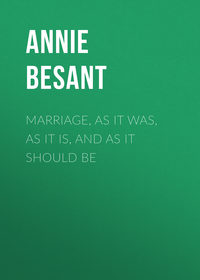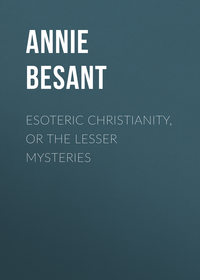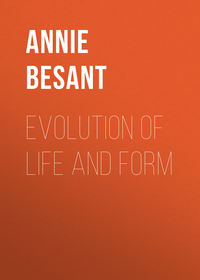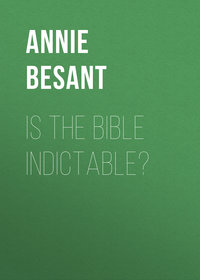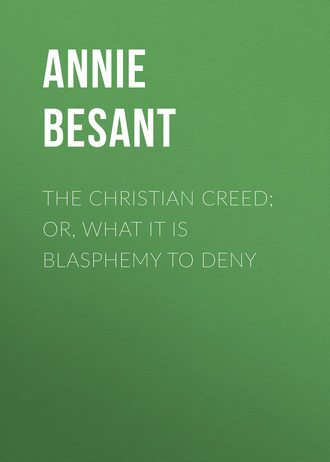 полная версия
полная версияThe Christian Creed; or, What it is Blasphemy to Deny
Jeremiah is a most melancholy prophet. He wails from beginning to end; he is often childish, is rarely indecent, and although it may be blasphemy to say so, he and his "Lamentations" are really not worth reading.
Ezekiel is both childish and obscene in the grossest sense. I can fancy how Sir W. V. Harcourt would characterise Ezekiel if he were not protected by law. In the first chapter we are introduced to a wonderful chariot, borne by four living creatures, each of whom had four wings and four faces, and four sides, and they had a "likeness" which was separate from them, for "it went up and down among the living creatures" (chap. i., 18); and the chariot had four wheels, or perhaps eight, for there was "as it were a wheel in the middle of a wheel" (v. 16); these wheels "went upon their four sides" (v. 17), which must have been very awkward, and they were full of eyes-what do wheels do with eyes? – and were "so high that they were dreadful" (v. 18); on the top of this conglomeration of four-faced creatures and eyed wheels was a firmament, and on the firmament a throne, and on the throne a man, amber-colored, and fire enwrapped, and the man was "the Lord." And it is blasphemy to deny the truth of this unintelligible jargon of absurdities. Then this man converses with Ezekiel, and "a hand" – apparently minus an arm and a body-brings a book (chap. ii., 9), and Ezekiel eats this "roll" (chap. iii., 1-3), a very indigestible one, 1 should fancy. Then Ezekiel takes a tile, and sketches a town on it, and pretends to besiege the tile, and sticks up an iron pan which he makes believe is an iron wall, and then he lies before it, making a fort and a mount, and bringing battering rams to bear on his old brickbat (chap. iv., 1-4). And it is blasphemy not to believe that this midsummer madness was god-inspired. The remainder of his conduct (w. 9-15) is too disgusting to mention, and as we are not protected, to print it would bring us under Lord Campbell's Act. The same remark applies to the unutterable nastiness of chaps, xvi. and xxiii. And this is in a book put into the hands of little boys and girls, without one protest from the Home Secretary. After all this we are not surprised to read "the spirit" lifted Ezekiel up in the air, "the form of a hand" taking him "by a lock of mine head" (chap. viii., 3). When we read that Gabriel lifted Mahomet in this manner, we say it is an impudent fraud; when we read it of Ezekiel it is "the very truth of God."
The book of Daniel has been so utterly destroyed by criticism that it would be wasted time to dwell upon it. Yet this book is kept as one of the "prophets," although it has been proved to demonstration that the pretended prophecies were written after the event.
The "minor prophets" deserve a pamphlet to themselves, so full of absurdities are they. Hosea, judging by chap. i., 2, 3, and iv., 1, 2, must have been a man of very indifferent character. His writings have the two characteristics of the minor prophets, indecency and maniacal raving; sexual vice is played upon in a manner that is wearisomely disgusting (see v., 1-13; iv., 12-14; v., 3, 4; vi., 10, etc., etc.). Amos tells us how "the Lord stood upon a wall made by a plumbline, with a plumbline in his hand. And the Lord said unto me, Amos, what seest thou? And I said, a plumbline" (chap. vii., 7, 8). Amos was always seeing queer things, and "the Lord" was always asking him what he saw! He saw some grasshoppers (vii., 1, 2), and a basket of summer fruit (viii., 1), and the "Lord standing upon the altar" (ix., 1). Jonah's adventures are famous, and it is blasphemy to deny that throwing Jonah into the sea stilled the waves, that a great fish swallowed him, that the fish was a whale (Matt, xii., 40), that he lived in the whale's stomach for three days and three nights, said his prayers there, and was thrown up safe and sound after living for seventy-two hours inside an animal! Zechariah is as bad for vision-seeing as Amos. He sees red, speckled and white horses among myrtle trees (i., 8), and then four horns (v. 18); a friendly angel talks with him (v. 9), and explains matters in a fashion that makes them more confused. Then there is a "man with a measuring line" (ii., 1), and Joshua the high priest "in filthy garments," whom they undressed and dressed up again (iii., 1-5). And there are a candlestick, and two olive-trees, and some pipes which "empty the golden oil," and which are the "two anointed ones" (iv.). Next comes "a flying roll," and then can anyone make sense of the following: "Then the angel that talked with me went forth, and said unto me, Lift up now thine eyes, and see what is this that goeth forth. And I said, what is it? And he said, this is an ephah that goeth forth. He said moreover, this is their resemblance through all the earth. And, behold, there was lifted up a talent of lead, and this is a woman that sitteth in the midst of the ephah. And he said, This is wickedness. And he cast it into the midst of the ephah; and he cast the weight of lead upon the mouth thereof. Then lifted I up mine eyes, and looked, and behold there came out two women, and the wind was in their wings; for they had wings like the wings of a stork: and they lifted up the ephah between the earth and the heaven. Then said I to the angel that talked with me, whither do these bear the ephah? And he said unto me, to build it an house in the land of Shinar: and it shall be established, and set there upon her own base." (Zech. v., 5-11.) Yet if we do not believe this we shall be dammed.
I might heap together yet more of these absurdities, but to what end? Who but a lunatic could have written such incoherent matter? Yet this Old Testament, containing error, folly, absurdity and immorality is by English statute law declared to be of divine authority, a blasphemy – if there were anyone to be blasphemed-blacker and more insolent than any word ever written or penned by the most hotheaded Freethinker.


